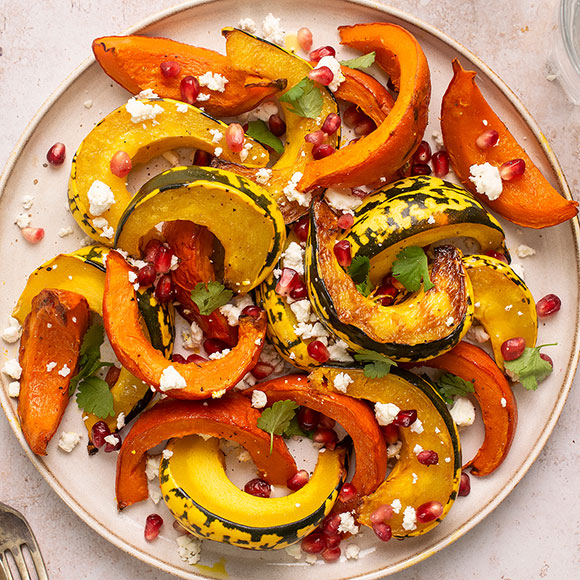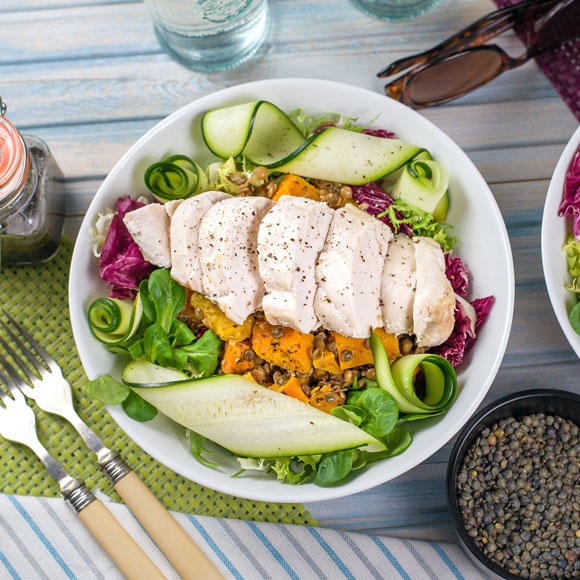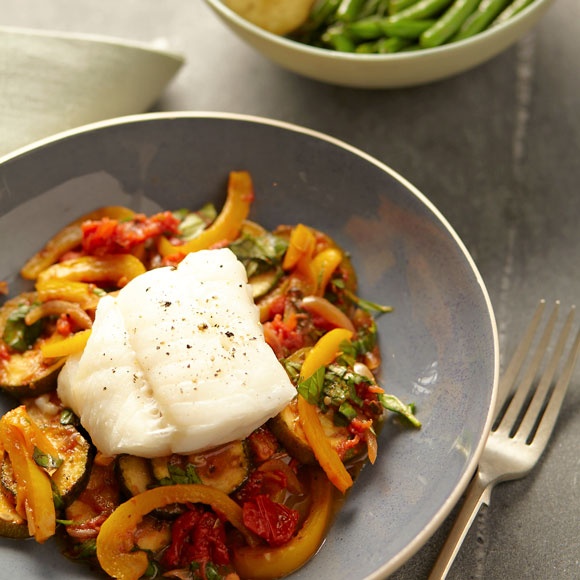Meat and cancer
Find out how eating meat affects your risk of cancer, and explore evidence on how red and processed meat can increase the risk of bowel cancer.

On this page
Some types of meat can be enjoyed as part of a healthy diet, such as chicken and turkey. But eating too much red meat and any amount of processed meat can increase your risk of bowel cancer.
Processed meat and some types of red meat can also be high in saturated fat and calories, which can contribute to weight gain over time if eaten often or in large amounts. Living with overweight or obesity can increase the risk of at least 13 different types of cancer.
That’s why one of our Cancer Prevention Recommendations is to limit red meat and avoid processed meat.
What’s the science behind meat and cancer?
Researchers are studying how eating red meat can increase cancer risk. One explanation involves a compound called haem, which contains iron and gives red meat its colour. Haem can trigger the creation of harmful compounds that can damage the lining of the bowel and increase the risk of bowel cancer.
Processed meat often has chemical preservatives called nitrites and nitrates added to it. They can turn into harmful compounds that increase the risk of bowel cancer.
Processed meat and cancer
Processed meat is any meat that has been smoked, cured, or had salt or chemical preservatives (nitrites and nitrates) added. Processed meat includes:
- Sausages
- Hot dogs
- Ham
- Chorizo
- Bacon
- Pepperoni
- Beef jerky
- Corned beef
- Charcuterie or deli meats such as salami, parma ham and saucisson
- Sliced luncheon meats, including those made from chicken and turkey
Our scientists recommend eating very little, if any, processed meat.
What about white processed meat?
Our research shows a strong link between processed red meat and bowel cancer, which is why we recommend avoiding processed red meat such as bacon and ham. When it comes to processed white meats like chicken, turkey or fish, it’s important to check the ingredients for preservatives like nitrates or nitrites. If these preservatives are absent, these options are generally better than red processed meats.
However, always check the salt content using the traffic light label – opt for products with a green label for salt, rather than amber or red, as having too much salt in the diet is bad for your health. Even with white processed meats, it’s best to eat them only occasionally.
Red meat and cancer
Red meat is any type of meat from the muscle of a mammal, including:
- Beef / veal
- Pork
- Lamb / mutton
- Horse
- Goat
Red meat is a good source of nutrients such as protein, iron, zinc and vitamin B12 so can form part of a healthy, balanced diet. But we don’t need to eat it every day.
We recommend limiting the amount of red meat we eat to 3 portions a week (350–500g or 12–18oz cooked weight). It’s best to choose lean, rather than fatty cuts of meat.
500g of cooked red meat is around 700–750g of raw meat. A medium steak is about 145g (cooked weight), and 3 slices of roast beef or pork is about 90g (cooked weight).
White meat and cancer
Our experts haven’t found any evidence that eating white meat affects your risk of cancer. This means white meat can be enjoyed as part of a healthy, balanced diet.
White meat includes:
- Chicken
- Turkey
White meat can also include duck and goose, but we don’t yet have enough evidence about how these types of meat affect your cancer risk.
Practical ways to eat less red and processed meat
1. Find an alternative
Try incorporating other sources of protein in your diet instead, such as:
- Plant-based protein sources like pulses, tofu and soy chunks
- Poultry like skinless chicken and turkey
- Fish like salmon, tilapia and canned tuna (in spring water)
- Eggs and dairy products like lower-fat cheese, and plant-based dairy alternatives
2. Eat smaller portions
Eating a smaller portion (about the size of a deck of cards) means you can have red meat more often and still have no more than 350–500g a week.
Make red meat go further by adding beans, chickpeas, lentils or mushrooms to bulk up stews, chilies and pasta sauces. This can help lower the calories in your meals, helps you to eat more plant-based foods and counts towards your 5 A DAY.
3. Easy swaps
Swap beef mince for turkey or vegetarian mince. Even if you only swap half, you’ll cut calories and it’s just as filling. Boost the flavour with onion, garlic, herbs and spices. You can also use smoked paprika to lift the flavour of dishes rather than adding chorizo.
Use alternatives to ham in your sandwiches. Try chicken, hard-boiled eggs, tinned tuna (in spring water), low-fat houmous or low-fat cream cheese. Add rocket or spring onions to a fresh flavour.
4. Have meat-free days
Keep some days meat-free. Base your meals around plant-based protein sources such as pulses and soya products, eg tofu, and other plant-based foods including vegetables, fruit and wholegrains.
Living with cancer
After a cancer diagnosis, follow our Recommendations, if you can. If you are living with or beyond cancer, we recommend that you limit red meat and avoid processed meat.
Diet and Cancer Report
Our 2018 Diet and Cancer Report looked at:
- Meat, fish and dairy products
- Preservation and processing of foods
It found strong evidence that:
- red meat INCREASES the risk of colorectal cancer
- processed meat INCREASES the risk of colorectal cancer
> Read the relevant chapters in our Science and policy library



